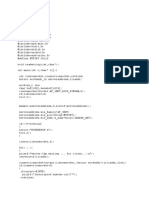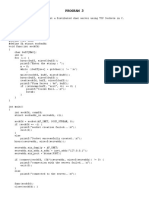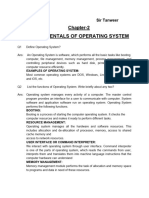0% found this document useful (0 votes)
7 views6 pagesNetwork Programming Lab
The document contains three C programs demonstrating TCP socket communication. The first program implements a daytime server and client that exchanges the current time, while the second program allows a client to send three numbers to a server, which returns their sum, difference, and product. The third program retrieves and prints IP and TCP socket options to a file, detailing various socket configurations.
Uploaded by
Mamtha P PCopyright
© © All Rights Reserved
We take content rights seriously. If you suspect this is your content, claim it here.
Available Formats
Download as DOCX, PDF, TXT or read online on Scribd
0% found this document useful (0 votes)
7 views6 pagesNetwork Programming Lab
The document contains three C programs demonstrating TCP socket communication. The first program implements a daytime server and client that exchanges the current time, while the second program allows a client to send three numbers to a server, which returns their sum, difference, and product. The third program retrieves and prints IP and TCP socket options to a file, detailing various socket configurations.
Uploaded by
Mamtha P PCopyright
© © All Rights Reserved
We take content rights seriously. If you suspect this is your content, claim it here.
Available Formats
Download as DOCX, PDF, TXT or read online on Scribd
/ 6















































































